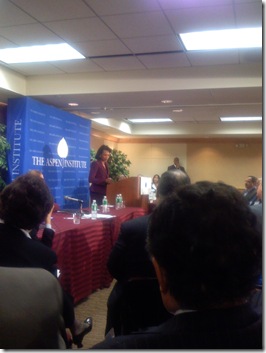It is striking how close Israeli Foreign Minister Tzipi Livni’s language below to the OneVoice philosophy, which was similarly adopted almost verbatim by Palestinian President Mahmoud Abbas, including after the session OneVoice organized with the World Economic Forum and them during Davos 2007:
Address by Israel’s Foreign Minister Tzipi Livni at the Organization for Security and Co-operation in Europe (OSCE) Mediterranean Seminar
I believe that the world is becoming more complex in a way, even though, on one hand, it looks like a small global village. From the bright side of this small global village, we can see that borders are less important, and when it comes to economy we can use the fact that borders are of less importance to enhance economic investments as well as to share our values. On the other hand, the fact that borders are of less importance is also being abused by extremists in order to spread their own extreme agenda. Thus, while we are trying to spread and to express our democratic values, the global village is being used and abused by those that represent the extremist ideologies in this world.
I believe that what we face right now is the division in the world between extremists and moderates. Sometimes we can see this extremist ideology being represented by a state, like Iran. But one of the challenges that we face is that while in the past we would see these kinds of threats coming from states, now we can see them coming from within states, where the state itself has difficulties in expressing its own sovereignty over its entire territory. We can see extremist or radical elements which are using the lack of enforcement of law and order inside these weak states in order to spread their ideology, to use force, to use violence against others. And we can also see some international organizations using the fact that the world is a global village in order not only to spread an ideology but also to undermine regimes or to undermine our own democratic values, sometimes, unfortunately, by using terror and violence.
So there is a need for us as part of the international community, who share the same vision for the future and the same values, to see what threats we face, to work together – and I know that it is sometimes not easy to work together and to find a consensus – to understand the nature of the threats and, on the other hand, what are the real measures that we can take in order to meet these challenges.
We need to identify the nature of the new threats, although sometimes we also face the old kind of threats that we used to identify in the past. We can see some new threats and we can unfortunately also sometimes see old threats in the guise of new ones. One example is anti-Semitism that has changed its form but still represents the same old hatred. I would like to express my appreciation to what this organization is doing in order to combat all kinds of anti-Semitism as a phenomenon in different places and to educate new generations as to the real nature of anti-Semitism and how to handle it, how to combat it and how to deal with it – not only in terms of states but also in terms of societies.
Talking about this specific seminar, I would like to say that, for me, it is very special because, talking about intolerance and discrimination and promoting mutual respect and understanding, Israel was established as a homeland for the Jewish people. I just spoke about anti-Semitism but the Jewish people suffered from this kind of intolerance and discrimination throughout our history, and part of our need today is to share the common vision to combat it in different places.
The other point is about promoting mutual respect and understanding. This is also an opportunity for us to share with you part of our experience as a state and as a society. When the State of Israel was established, it absorbed people coming from different places in the world. It took us some years to understand that instead of changing the "other", we need to respect the places from which they came. We need to respect different groups, we need to respect the different traditions of those places from which they came to Israel and which they brought to Israel with them. This is a very specific experience that Israel can share with others. It was not easy to do at the time, and I think that we have learned something from our own experience and we are happy to share it with you.
Of course, Israel shares its democratic values with the international community, with the world, what we call the free world, the modern world, but, unfortunately, there is a gap between what Israel is and the perception of Israel is in different places. So, for us, this is an opportunity also to "re-share" our values and to think together about ways to combat discrimination. And the other goal, and maybe this is the most important goal and task for Israel these days, is that we are in what is perhaps one of the more complicated situations in the world in which, on the one hand, we need to defend ourselves, we are in a situation in which we have this conflict between Israel and the Palestinians. And on the other hand, we need to address their needs; we need to address their humanitarian needs. We need to change the situation on the ground in terms of education, working together with the Palestinian government, the legitimate government, in order to change education, in order to bring this vision of living side by side in security and peace, not only to Israel but also among Palestinian society.
While we are defending ourselves, we also need to act according to our own values – and, believe me, it’s not easy. It’s not easy when Israel is being targeted on a daily basis by Kassam rockets from the Gaza Strip. We have the power and the ability to meet this challenge in military terms but, on the other hand, Israel is not a state that will act against its own values, but will try to avoid any kind of civilian casualties, and so on. So, on a daily basis we have this combination between the need to defend ourselves and the need to defend our democratic values, and this is not less important. As decision makers, we have this kind of ongoing dilemma on our table.
For us, this is an opportunity to share with you the situation on the ground, the political situation on the ground which also impacts the way to promote our mutual goals.
A few words about the situation and the beginning of the negotiations between Israel and the Palestinians – and maybe this also represents the way we see the region in terms of extremists and moderates. I believe that we should put aside the old vision about the Israeli-Palestinian conflict because, in a way, Israel plus the moderate and pragmatic leaders among the Palestinians share the same vision of two states for two peoples. We also understand that, in order to accomplish this, we need to confront terrorism, as the Palestinians understand that in order to do so, for their own sake and not only for the sake of Israel, they need to confront terrorism.
If in the past we used to speak about the conflict in terms not only of an Israeli-Palestinian conflict but a Jewish-Arab conflict or an Israeli-Arab conflict, I believe that there is an understanding today among other states in the region that the threat comes from the extremists, the radical elements, among their own states – radical elements like Iran in the region. So basically they share the same understanding of the challenges, the mutual challenges, and this also changes the alliances in the region.
















